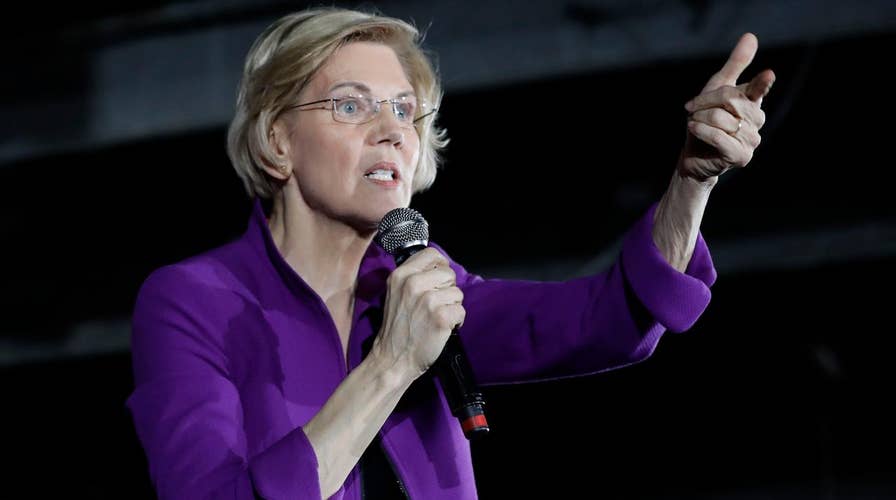2020 Democratic presidential hopeful Elizabeth Warren proposes the breakup of big tech companies
Contributor Jehmu Greene and former Obama for America spokesman Zach Friend weigh in on Sen. Elizabeth Warren’s proposal to breakup big tech companies.
Elizabeth Warren has gone off the rails. Frantic to stand out in a crowded field of Democrats running for president, the Massachusetts senator has grabbed ahold of one outlandish policy after another, leaving most commonsense Americans far behind. Her most recent idea? Breaking up America’s successful tech companies, which have created untold wealth for the United States and are the envy of the world.
Warren looks desperate. She is desperate. And it has nothing to do with her embarrassing (and offensive) claims to Native American heritage.
2020 DEMOCRATIC PRESIDENTIAL HOPEFUL ELIZABETH WARREN PROPOSES THE BREAKUP OF BIG TECH COMPANIES
Instead, Warren has probably concluded that her moment has passed. The financial crisis put Ms. Warren on center stage as legislators struggled to rein in and punish the nation’s largest banks. Thanks to the recurring financial failures of her father, Warren grew up dreading that the local bank would foreclose on the family’s home. Simply stated, she hates banks and bankers, and jumped at the chance to put them in their place.
In the aftermath of the downturn, she became the financial sector’s fiercest critic, ultimately helping to establish the Consumer Financial Protection Bureau as part of the Dodd-Frank legislation. Her advocacy was so strident that President Obama declined to appoint her head of the controversial new agency, but her fingerprints were all over it, earning her substantial visibility.
Come 2016, many expected Warren to run, but she demurred to Hillary Clinton. Now, the country has moved on. Dodd-Frank, which raised capital requirements and put in other safeguards, became law in 2010. It has since been softened somewhat, over the objections of Warren, as even Democrats realized the bill was overly restrictive. Last year we noted the 10-year anniversary of the collapse of Lehman Brothers, one of the seminal events that triggered the crisis. Those dark days are not forgotten, certainly, but are not top of mind, either.
With her anti-bank crusade no longer resonating as it once did, Warren is flailing, appropriating every far-left program in sight. She adores the Green New Deal, can’t wait to legalize marijuana, enthusiastically backs reparations, and naturally favors Medicare-for-all. She has also proposed a wealth tax, even though it has proved damaging in other countries.
But the bedrock of Warren’s platform is that corporate America is the enemy.
It’s a strange focus, given that about 40 percent of American workers are employed by big firms. Do those people agree with Warren?
Warren has been in the Senate for over six years; if she doesn’t like our tax code, she should try to change it.
Last year, Warren introduced the Accountable Capitalism Act, which would put Uncle Sam in charge of how American businesses are run. Among other things, it demanded that every company with more than one billion in revenues acquire a federal charter and that employees elect 40 percent of corporate board representatives. Jeffrey Miron, Harvard director of undergraduate studies, said in an interview on CNBC that Warren’s bill would “destroy capitalism.” He was not alone in that assessment.
Warren’s most recent attack on business is her proposal to break up large tech firms like Amazon and Facebook, an idea the New York Times described as “expansive.” Our tech giants, it’s worth noting, have spawned countless related businesses and inspired an entire generation of innovation. What millennial does not pine to create the next Facebook or Google?
In launching this latest fantasy, the New York Times reported, Warren likened Amazon to “the dystopian novel “The Hunger Games,” in which those with power force their wishes on the less fortunate.” Warren summarized: “I’m sick of freeloading billionaires.”
Such rhetoric may resonate with progressives, but it sounds phony coming from a supposedly intelligent law professor. Who are those free-loading billionaires? Jeff Bezos, who has built an extraordinary company that most Americans rely on to make life simpler and that employs nearly half a million workers? Amazon’s sin is that it doesn’t pay much in taxes; that’s because the company had many years of losing money. Our tax code allows firms to carry forward past losses to reduce current taxable income. Warren has been in the Senate for over six years; if she doesn’t like our tax code, she should try to change it.
Meanwhile, the country does not share her view that the government needs to bring big business to heel. According to Gallup, nearly three-quarters of the country thinks there is “too much” or “about the right amount” of government regulation of Big Business, with only 25 percent thinking there should be more.
Warren recently declared that during primary season she will not hold the kind of pricey events that typically attract deep-pocket donors and big contributions. “The wealthy and well-connected have been taught by politicians to expect that more money buys more access,” she said smugly.
Some think that Warren’s self-righteous pledge is designed to lower expectations of her fund-raising ability. The day Warren announced the formation of an exploratory committee, she raised $299,000 in online donations. The day Kamala Harris entered the race she took in $1.5 million and Bernie Sanders hauled in $6 million.
CLICK HERE TO GET THE FOX NEWS APP
Elizabeth Warren ranks fourth or fifth in most surveys of likely candidates; Bernie Sanders and Kamala Harris have the pole position, with Joe Biden looming as possible front-runner should he enter the race. Judging from anxious emails the senator is sending out pleading for donations, and despite having $11 million left over from her Senate campaign, she will not likely have the funds to narrow the gap.
Meanwhile, she has offended the financial and tech industries – both important constituents in her state – as well as wealthy donors. No wonder Warren is desperate.









































